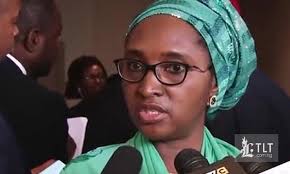The Federal Government on Wednesday hinged Nigeria’s exit from economic recession on the gains from its ongoing economic diversification agenda, particularly the value addition from the implementation of the Economic Sustainability Plan (ESP).
The Minister of Finance, Mrs. Zainab Ahmed, made this known while chatting with State House correspondents at the end of Federal Executive Council (FEC) meeting at the Presidential Villa, Abuja.
While recalling the various reforms initiated by the government in the past year to revitalize the ailing economy which plunged into recession in the last quarter of last year, the minister noted that the results of the implementation of the measures showed that the economy would sustain its recovery trajectory in the quarters ahead.
She said: “The Federal Executive Council, we had the opportunity to brief Council on the National Bureau of Statistics recently published fourth quarter GDP report estimates, which measure the economic growth of our country. Nigeria’s GDP in the fourth quarter of 2020 grew by 0.11% and in real terms in the fourth quarter of 2020. This follows, if you recall, two consecutive negative growth in the third quarter and the second quarter of 2020, which saw us as a country going into recession.
“As a result of this fourth quarter positive growth, the total growth for the year 2020 is -1.92%. Recall that we had ourselves reported, that we will be going into a negative growth at the end of 2020 at -4% and some of the international development institutions reported much higher negative growth for Nigeria. So at -1.92%, it is a very good performance.
“But also the good story for us is that, with this positive growth in the fourth quarter it means Nigeria has exited recession. This is one of the shortest lived recessions we have witnessed in the country, despite the impact of the COVID-19
“But I must say that the result of this exit is as a result of the fiscal policies, the monetary policies and the Economic Sustainability Plan that the administration of President Muhammadu Buhari has been implementing.
“So out of the 46 sectors of the economy, 17 recorded positive growth and this is higher than the number of sectors that had recorded positive growth in the third quarter. In real terms, the growth between the third quarter and the fourth quarter is a positive growth of 3.73%, a movement within one quarter we have never witnessed in this country, so we’re growing from one quarter to another by 3.73 per cent”, the minister added.
According to her, the movement from the second quarter to the third quarter also witnessed a growth of 2.48% is an indication that the policies that are being implemented are the right ones and the trajectory is a positive one, forecasting that “Nigeria is well on its way of restoring a consistent and stable growth, a growth that we hope to grow to be a strong growth from the fragile growth that we now have at 0.11%.
In her further analysis of the sectoral performances, she clarified: “On a broad sectoral basis, the Agricultural Sector posted a strong growth of 3.42% during the last quarter and when you compare to the previous quarter, it’s a much better performance.
“Similarly, Services Sector grew. Other sectors that witnessed slowdown in growth include Industry, crude, petroleum and natural gas sectors. The decline in oil production and prices in 2020, of course reflective of global drop in demand, and it is one of the major reasons why our country went into recession.
“Another positive story for us is that the non-oil sector grew by 1.69%. This is an indication that the diversification efforts that the economy has been pushing is actually also posting results; while the oil sector is declining, the non-oil sector is is growing
“We’ve seen overall economic activities reported strongly in the quarry and minerals sector, in the ICT and Telecommunications sector, in the cement industry, in broadcasting, in crop production as well as in agriculture.
“On the other hand, there are some sectors that are still witnessing negative and that’s why I said the growth is still fragile. These sectors include oil refining, air transport, coal mining, crude petroleum production, as well as accommodation and food services”, Ahmed added
She hinted that the government was integrating the principles and the tenets of the ESC into the new National Development Plan, adding that government hopes that the Medium Term Plan will be completed and launched in the month of April.






